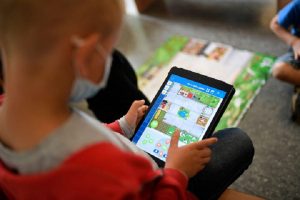A tablet for a child – harm or benefit?

Tablets have become an increasingly popular tool for children’s education and entertainment, but parents may wonder whether they are more beneficial or harmful for their child. As an AI language model, I do not have personal opinions, but I can present research findings and expert opinions.
One of the potential benefits of using a tablet for a child is educational apps. Tablets can provide access to a range of educational apps that can help children learn and develop skills in various subjects. For example, apps for math, reading, science, and foreign languages can help children learn and develop these skills at their own pace. Educational apps can also be tailored to a child’s individual learning style and abilities.
Another benefit of using a tablet for a child is entertainment. Tablets can provide a source of entertainment for children, such as games, videos, and e-books. This can be especially useful during long car rides or waiting at appointments. The interactive nature of tablets can also help children develop fine motor skills and hand-eye coordination.
Tablets can also help children develop digital literacy skills, including how to navigate digital interfaces, use search engines, and communicate online. These skills are becoming increasingly important in our digital world, and learning them early can be beneficial.
However, excessive use of a tablet can lead to negative effects on a child’s health and development. One of the most commonly cited concerns is that children who spend too much time on a tablet may have reduced physical activity, which can lead to obesity and other health problems. In addition, prolonged use of a tablet can lead to eyestrain, headaches, and neck and back pain.
Excessive tablet use can also lead to social isolation and reduced face-to-face interaction with others. Children need opportunities to interact with others to develop social skills and build relationships. Spending too much time on a tablet can lead to reduced opportunities for these experiences.
Another concern is that overuse of a tablet can lead to addiction-like symptoms, such as withdrawal, anxiety, and mood swings. This is because tablets can provide an instant gratification that can be addictive, and children who spend too much time on a tablet may have difficulty transitioning to other activities.
To ensure that a tablet is more beneficial than harmful for a child, it is important for parents to set limits on screen time and monitor the content that a child accesses on the tablet. The American Academy of Pediatrics recommends that children aged 2 to 5 years have no more than 1 hour of screen time per day, and that children aged 6 years and older have consistent limits on the amount of time spent using electronic media.
Parents should also ensure that children engage in a variety of activities, including physical exercise, social interaction, and creative play. Tablets can be a useful tool for education and entertainment, but they should not replace these other important activities. Parents should also choose high-quality educational apps and games, and monitor their child’s use of the tablet to ensure that it is used safely and appropriately.
In summary, whether a tablet is beneficial or harmful for a child depends on how it is used and for what purposes. A tablet can offer educational benefits and entertainment for children, but excessive use can lead to negative effects on their health and development. Parents should set limits on screen time and monitor the content that a child accesses on the tablet, and ensure that children engage in a variety of activities to support their overall development.

